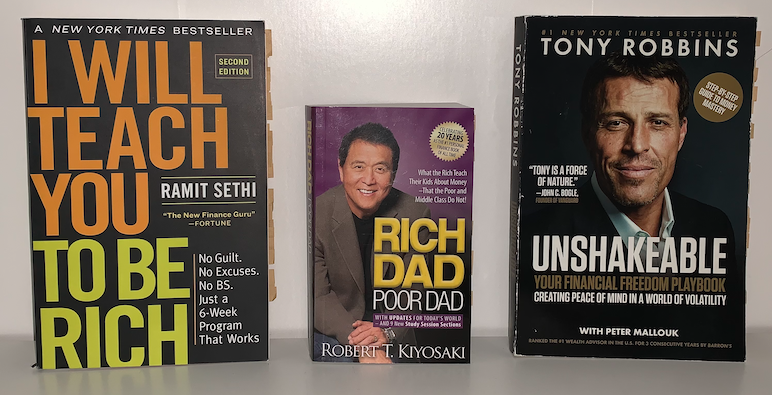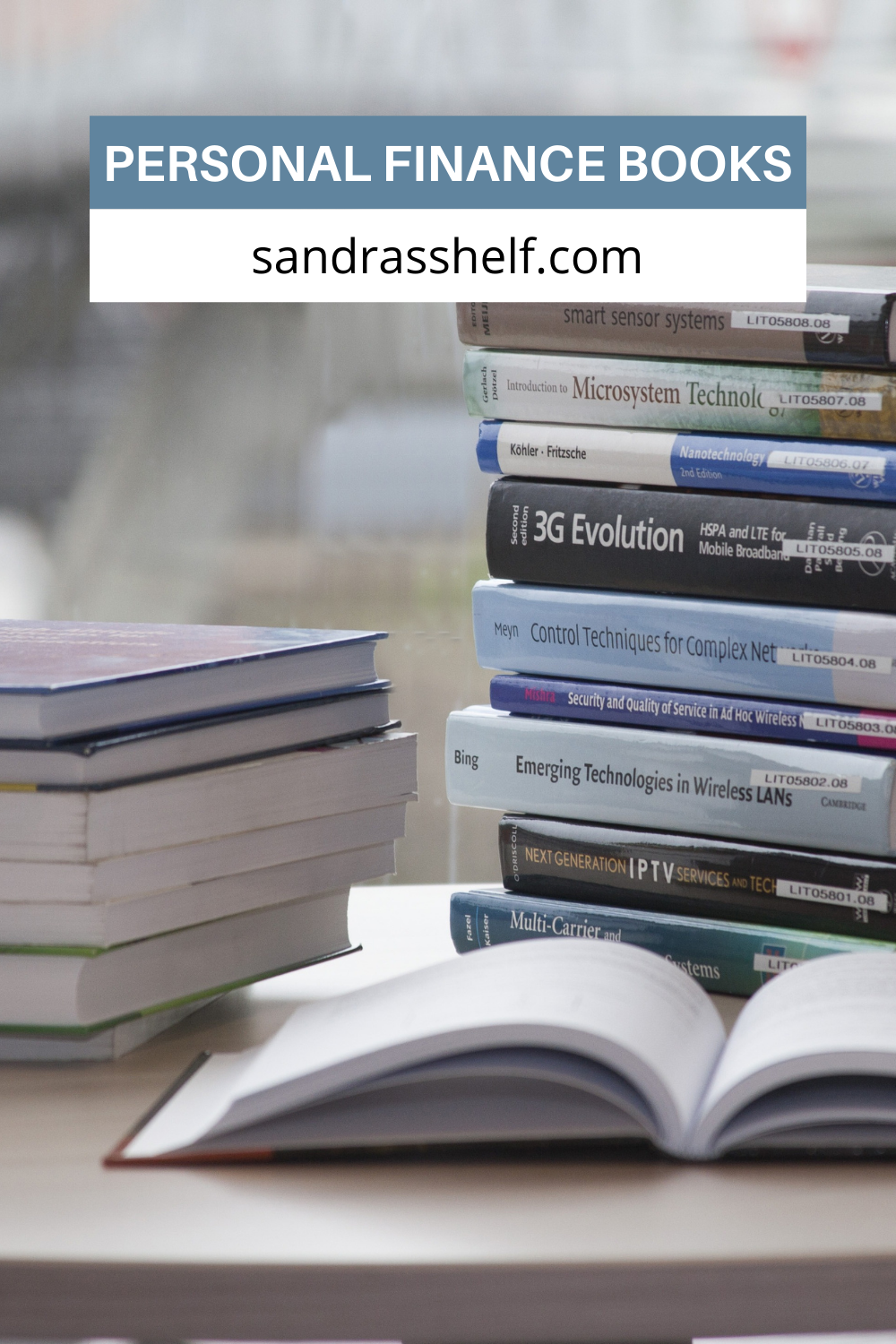This post may contain affiliate links, which means I’ll receive a commission if you purchase through my links, at no extra cost to you. Please read my full disclosure for more information.

Before getting into the top 3 personal finance books I recommend for beginners, I need to offer a little preface to my own personal finance journey.
It is my belief that everyone comes to the startling conclusion that they need to take care personally of their finances. The realization comes sooner for some and later for others.
Being aware of your finances will enable you to live a more fulfilling and intentional life. By being aware you can avoid yourself a lot of stress, pain, and uncomfortable feelings such as being stuck, hopelessness, depression, and the list goes on.
Talking about money is not easy. Facing money problems is even harder.
In this post, I am not simply talking about saving your money or simply budgeting; personal finance involves both but also so much more. It is about being in control and understanding your finances as well as your emotions towards your money as its earned, spent, saved, invested, etc.
I woke up one day and realized I knew absolutely little to nothing about money and the types of way to make and save money. I knew briefly about passive income streams and tax-free savings account, but my knowledge of the two were very limited.
SEE ALSO: The Keys to a Success Story – Lessons from “Outliers”
A lot about money did not make sense to me.
I thought money was straight forward and that I had to follow the blueprint others entrusted ontome: such as complete higher education, get a good job, put in hours, get paid, pay my bills, pay my debts, and save all of the rest of my income.
Don’t get me wrong!
This is a full-proof and safe method to deal with your finance but it is also not the only way.
Since we are talking about personal finance, there is no right way because everyone deals with their finances differently. Yet, I am a firm believer that it is good to learn about the different ways to earn, invest, save, and budget your money to say the least.
I realized that it can only benefit me to learn more about finances, business, and money. Since starting this journey, I am much less anxious and much more aware with every aspect of my finances.
SEE ALSO: 10 Girlboss Tips for a Successful Business and Life from Sophia Amoruso’s book “#GIRLBOSS”
These top 3 personal finance books are some of the books that I started with when I made the decision that I wanted to learn more in order to take care of my finances.
From these books, I share my main takeaways that have influenced me and my life as well as my journey towards my financial freedom. I believe all of these books are worth your time and personal read-through depending on where you are in your own personal finance journey.

1. “I Will Teach You to be Rich” by Ramit Sethi
“I Will Teach You to be Rich” is a very insightful personal finance book as it surveys so many different monetary aspects that arise during a lifetime.
This book is also formatted as a 6-week effective program to help you deal with your finances. In this matter, every week you can deal with something new at your own pace.
Week 1 : Learn to set up your credit cards and pay off debts
Week 2 : Learn to set up the right bank accounts
Week 3 : Learn to open an investment account
Week 4 : Learn to manage your money
Week 5 : Learn to automate your accounts
Week 6 : Learn to invest which is not only picking the right stocks
As for me, I never knew I could optimize my credit cards to get further travel points and rewards. Honestly, it sounds silly because I hear the commercials on the TV and stereo but never thought much about it when I had my student account (with TD bank Canada) during my university degree(s.)
As an adult, I am seeing the value of scraping every reward and points in exchange for my money all while building great credit. Ramit Sethi also talks about credit score. I have built great credit – and this was a topic I thankfully knew about (thanks to my dad) – and have been building since owning my very first credit card.
Furthermore, Ramit Sethi gives scripts – yes scripts in his book – on how to get unnecessary fees waived on your credit cards. I have used this method and showed up to the bank to make sure they weren’t charging me for unwanted fees. All of the little fees add up at the end, it’s like debt; it collects. Plus, Ramit Sethi offer many other scripts to help you negotiate your earnings (say, at your job) and spendings (say, when buying a brand new car).
Another aspect I want to talk about is the part on investing and starting an investment portfolio. Ramit Sethi breaks it down quite simply and easily for new investors such as myself. Sethi explains that investing is not only for the rich, it is for the long haul and it is for EVERYONE.
At first, when I used to hear about ‘stocks’ or more broadly ‘investment,’ my skin used to crawl. But now I know that there are ways to manage your risk while investing. Knowing about terms like “asset allocation” helped me to overcome this fear. The more diversified your portfolio becomes, the less volatile your investments become.
Thus, Ramit Sethi surveys the different asset classes such as stocks, bonds, stock fund, and stock bonds. He includes a photo a pyramid of investing options to highlight the risk vs. return ratio on investment.
As a young woman in her early 20s, I can invest more on stocks than bonds as I have time working by my side. Yet, it is important to know all of the steps and risks for investing even for retirement. Ramit Sethi presents asset allocation for different age groups.
Don’t get me wrong… there are a lot of nuggets of information in this one. From talking about finances with your spouse as well as saving up for marriage and big life events. From shopping for a car before actually shopping for a car, and everything in between.
I am just revealing to you the parts of the book that have personally impacted my own journey. I believe “I Will Teach You to be Rich” is a good starting point as it also prepares for what is to come if you are just starting out your journey like I am.
2. “Unshakeable” by Tony Robbins
I need to talk about “Unshakeable” next because it is a great book to pick up after you initially have the spark and determination to open a Roth IRA (US citizen) or a TFSA Tax Free Savings Account (Canadian citizen). Or any of your own country’s equivalent to a tax free savings account. If you are a Canadian – like myself – I want to offer you a heads up since these books talk a lot about the American 401(k) and Roth IRA. However, the core information still remains relevant.
Tony Robbins collected the knowledge of fifty of the greatest financial minds through interviewing them. Meaning that, Robbins knows what he’s talking about. He’s done his research, he has created his own financial freedom plan. He has interviewed big time investors such as Warren Buffet, Ray Dalio, David Swensen, and Jack Bogle.
In “Unshakeable,” Robbins teaches that indexing is the way to go for the common person like him, like me, and like you.
Tony Robbins takes a look at the trends of bear and bull markets as well as people’s emotional responses to investing all while presenting graphs and table analysis of the market throughout the last century.
Here are some of the freedom – researched and presented – facts that Robbins share and have helped me to pursue investing my money with an easier conscious:
Freedom Fact #1: On Average, Corrections Have Occurred About Once a Year Since 1900
Freedom Fact #2: Less Than 20% of All Corrections Turn Into a Bear Market
Freedom Fact #3: Nobody Can Predict Consistently Whether the Market Will Rise or Fall
Freedom Fact #4: The Stock Market Rises over Time Despite Many Short-Term Setbacks
Freedom Fact #5: Historically, Bear Markets Have Happened Every Three to Five Years
Freedom Fact #6: Bear Markets Become Bull Markets, and Pessimism Becomes Optimism
Freedom Fact #7: The Greatest Danger Is Being out of the Market
Then, Tony Robbins has an entire section on the psychology of wealth. It is very insightful since as humans we operate primarily through the principle of loss aversion. We are too terrified of losing money that we ignore the possibilities of smartly, consistently making more money.
Therefore, “Unshakeable” is a playbook to your financial freedom journey and I intend on reading his other books “Money: Master the Game: 7 Simple Steps to Financial Freedom” and “Awaken the Giant Within” and reporting back to you in a few months, dear readers.
3. “Rich Dad Poor Dad” by Robert T. Kiyosaki
“Rich Dad Poor Dad” is a highly acclaimed book. Even my dad knows about it… and that’s saying something to me. So I knew that I absolutely had to read it. And report back to my dad (who is not a reader.)
Growing up, Kiyosaki learned money lessons from his rich dad – who is the father of his close childhood friend – that had a lower education but possessed his own company. He juxtaposes his rich dad with his own dad, who he labels “poor dad” although he is an educated upper-middle class worker.
The difference between the two dads lays in their financial literacy. Rich dad works for himself and have others working for him while poor dad works for the government for the rest of his life.
I think this book is highly illuminating without being disrespectful to higher education and middle-class workers. It shows readers that there are more than one school of learning and that education extends far beyond schooling and home environment.
Hence, the differences between rich dad and poor dad.
Furthermore, Kiyosaki rises topics such as taxes (who gets taxed and why. A hint: it’s the middle class.) As well as the topic of assets vs. liabilities in which he digs deep at our conventional way of thinking about the secure path to life, that looks a lot like:
completing a higher education -> working a 9 to 5 -> owing debts -> buying liabilities (big houses and cars) -> paying lots of taxes -> retiring at an old age -> dying before achieving any financial freedom
Obviously I oversimplified this model and it seems quite cynical and depressing in this approach. Yet, for some of us, me included, it is a sad reality.
This prompted me to have a lot of conversations with my elders, parents and neighbors, to affirm that this is the model they follow and the models their children are following, despite their hopes and dreams that a higher education would guarantee a happier, healthier, richer, financially freeing life.
Therefore, it is by not working for money but instead by having money work for you and that one can reach this financial freedom and enjoy one’s life to the fullest. Yet, it takes a lot of creativity and hard work to kickstart the method presented by rich dad.
Business owners can earn and spend before they even pay taxes while, workers, consequently, earn, pay taxes, and then spend their money.
In summary, it is by possessing financial literacy and therefore financial intelligence that gives you the power and control over not only your finances and your money but over your entire life including retirement and spare time to actually enjoy and profit from your life. That is the true wealth discussed by Kiyosaki in his “Rich Dad, Poor Dad” book.
This concludes my recommendations on the top 3 personal finance books for beginners. I am excited to continue this journey and read many more books on the topic.
I plan to make many more posts on this subject!
The more I read about personal finance, the more in control I feel with my own life and my finances as I take actionable steps towards building my future and achieving my financial freedom.
I hope this post will help you start your own personal finance journey and I hope these books will also aid you in doing so.
Feel free to comment your favourite personal finance books! 🏦
Enjoy the post? Save Pin for later!











These are such great recommendations! I’ve been needing a book like this! Thanks for the ideas!
I’m glad you got value out of this! 🙂
Amazing recommendations! I’ve always wanted to read rich dad, poor dad as I’ve heard so much about it. Without even reading it yet this book has already started to change my perspective on money and obtaining financial freedom.
I’m glad you enjoyed these recs!! Yes it’s a must-read: it will change some of your perspective and hopefully help you as it helped me! 😊